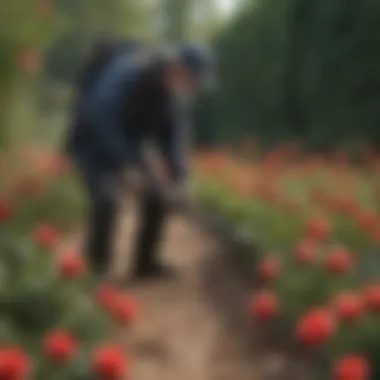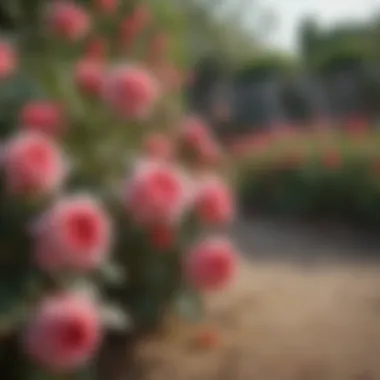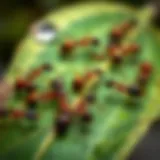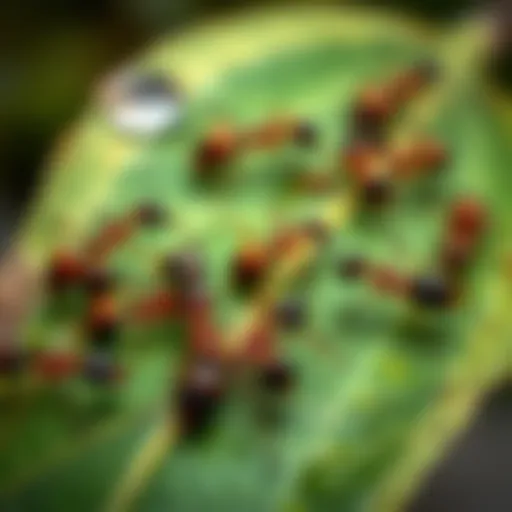Comprehensive Guide on Rose Exterminators Services


Intro
Maintaining a beautiful rose garden is a rewarding pursuit for homeowners. However, this passion often faces challenges, particularly from pests that target these delicate plants. Rose exterminators play a critical role in safeguarding your garden from these nuisances. This guide seeks to provide an extensive overview of pest control specifically for rose plants, detailing the biology and life cycles of common pests, as well as effective control methods and prevention strategies.
Understanding the intricacies of pest management is essential for keeping rose plants healthy. This article will cover the key aspects related to pest identification, effective control methods, and preventative measures. By arming yourself with this knowledge, you can make informed decisions regarding pest control services and maintain the beauty of your garden.
Understanding the Pest
To effectively deal with pests, a solid understanding of their biology is crucial. Not all pests are created equal, and some may cause more harm than others. Recognizing the signs of infestation and understanding pest behavior can lead to early intervention, saving your roses from irreversible damage.
Identification
Identifying the specific pest affecting your roses is the first step in effective pest control. Common pests include aphids, spider mites, and Japanese beetles.
- Aphids: Small and often green or black, these pests cluster on new growth and stems.
- Spider Mites: These tiny arachnids are hard to spot but leave fine webbing.
- Japanese Beetles: Metallic green with coppery wings, they can be seen feeding on leaves.
Understanding the specific pests in your garden allows for targeted treatments.
Life Cycle
Knowing the life cycle of pests helps in devising effective control measures.
- Aphids reproduce rapidly and can produce multiple generations in a single season.
- Spider mites have a fast life cycle, with a generation taking as little as seven days in perfect conditions.
- Japanese beetles emerge in late spring, feeding and laying eggs before dying by summer’s end.
By understanding these cycles, proactive measures can be implemented at different growth stages.
Pest Prevention Strategies
Preventing pest infestations before they start is often more effective than trying to control them after they develop. Here are some strategies that homeowners can incorporate into their rose care routines.
Environment Modification
Modifying the environment where roses grow can create unfavorable conditions for pests.
- Ensure proper airflow around the plants.
- Avoid overwatering, which creates humidity attractive to pests.
- Select robust rose varieties that are more resistant to pests.
Physical Barriers
Using physical barriers can protect roses from pests effectively.
- Install row covers during the growing season.
- Use fine mesh nets to deter larger pests like beetles.
Physical barriers not only protect plants but also contribute to the overall health of your garden.
Control Methods
Sometimes, despite preventive measures, pests still invade. When this happens, it is crucial to employ effective control methods tailored to the specific pest and situation.
Chemical Control
Chemical pesticides can be effective but require careful selection. Homeowners must choose products that are safe for roses and non-toxic to beneficial insects.
- Always read instructions before applying.
- Apply in the evening to minimize harm to pollinators.
Biological Control
Biological control employs natural predators to manage pest populations. This method is often safer for the environment.
- Introduce ladybugs to control aphid populations.
- Use nematodes to target soil-dwelling pests.
Biological control can lead to a balance in the ecosystem, promoting a healthier garden overall.
Understanding Rose Exterminators
Understanding the role of rose exterminators is essential for anyone who cherishes their garden. Pest control is not merely about eliminating bugs; it involves holistic management of pest populations that threaten the vitality and beauty of rose plants. The presence of pests can negatively impact not only the aesthetics of a garden but also the overall health of the plants. During the growth cycles, roses can attract various insects and diseases that require immediate attention.
Professional exterminators provide knowledge and expertise beyond simple solutions. They help clients understand the nature of these pests and the best ways to protect their roses. Moreover, knowing the specific services offered by exterminators can guide homeowners in making informed decisions.
Definition and Role
Rose exterminators are specialists equipped to manage and control pests that affect rose plants. Their primary role is to assess pest situations, recommend suitable solutions, and implement measures that ensure long-term health for the roses. This involves identifying specific pests and understanding their life cycles to provide effective treatments.
The contribution of rose exterminators to pest management is invaluable. They not only apply treatments but often educate clients about potential threats and preventative measures, leading to better garden care.
Types of Services Offered
Chemical Extermination


Chemical extermination is a common service provided by rose exterminators. It involves the use of various insecticides designed to target specific pests while aiming to minimize harm to the plants and beneficial insects. One important aspect of chemical extermination is its effectiveness in quickly reducing pest populations. For homeowners who want immediate results, this method can be a popular choice.
However, it comes with its own set of challenges. The unique characteristic of this approach is its reliance on synthetic products, which may raise environmental concerns. Homeowners must weigh the benefits against the potential risks in their own gardens.
Biological Control
Biological control employs natural predators or parasites to manage pest populations. This method has gained attention for its environmentally friendly approach. The key characteristic of biological control is its sustainability, allowing the ecosystem to balance itself over time. For example, ladybugs can be introduced to consume aphids that damage rose plants.
One advantage of biological control is its minimal impact on non-target organisms. However, it may not provide immediate results like chemical options. This means patience and a degree of monitoring are necessary for success.
Integrated Pest Management
Integrated Pest Management (IPM) combines different methods to create a holistic approach to pest management. This strategy uses a mix of chemical, biological, and cultural techniques tailored to specific pest challenges. The core idea of IPM is to minimize risks to people and the environment while effectively controlling pest populations.
One of the benefits of IPM is its adaptability. It can evolve based on the pest’s life cycle and the specific conditions of the garden. Homeowners may find this method ensures long-term health for their plants, although it requires ongoing monitoring and flexibility in approaches.
In summary, understanding the role and types of services offered by rose exterminators is crucial for effective pest management. Whether choosing chemical extermination, biological control, or an integrated approach, each service has its unique advantages and limitations.
Why Seek Professional Help
Caring for rose gardens requires more than just an appreciation for beauty. Effective pest management is crucial to ensuring the health and longevity of the plants. Seeking professional help is an essential step for homeowners and gardeners who want to maintain vibrant rose bushes. Professionals bring a depth of knowledge, experience, and resources that often surpass DIY efforts. This section examines the importance of choosing professional extermination services for rose pest issues and outlines the key benefits as well as the risks involved in taking the do-it-yourself approach.
Benefits of Professional Extermination
Engaging a professional exterminator comes with multiple advantages that support the effective management of rose pests. Below are some notable benefits:
- Expert Knowledge: Pest control professionals have training and expertise in identifying pests specific to rose plants. They understand pest behavior and life cycles, enabling them to devise targeted strategies that are more likely to yield results.
- Access to Resources: Exterminators have access to a range of commercial-grade products and tools often not available to the average gardener. These solutions can be more effective than over-the-counter options.
- Integrated Pest Management: Many professionals employ Integrated Pest Management (IPM) techniques. This approach focuses on long-term prevention and minimizes the use of chemicals, promoting a healthier gardening environment.
- Time and Effort Savings: Dealing with pests can be time-consuming. Professional services allow homeowners to focus on enjoying their gardens instead of worrying about pest infestations.
- Safety Measures: Professionals know how to handle and apply chemicals safely, reducing the risk of harm to people, pets, and beneficial insects.
Utlizing professional services can greatly enhance the health of rose plants and provide peace of mind.
Risks of DIY Approaches
While some may consider taking a DIY route for pest management, there are significant risks associated with this approach:
- Misidentification of Pests: Homeowners may not accurately identify the specific pests affecting their roses. Misidentification can lead to the application of inappropriate treatments that do not effectively resolve the issue.
- Improper Use of Chemicals: Without the proper training, individuals could misuse chemical treatments. This not only poses a risk to the plants but also to the environment and personal health.
- Inadequate Solutions: Home remedies or superficial treatments might only provide temporary relief, allowing pests to return stronger.
- Increased Costs in the Long Run: Initial savings from attempting DIY solutions may end up costing more if infestations worsen and require professional intervention later.
Common Rose Pests
Common rose pests are critical subjects in discussions about maintaining healthy rose plants. Understanding these pests allows gardeners to take preventive actions, ensuring the roses flourish. In this section, we will explore how to identify these pests and their impacts on overall rose health.
Identifying Rose Insects
Recognizing rose insects is vital for effective pest management. Rose bushes are susceptible to a variety of pests, including aphids, spider mites, and thrips. Each pest has unique characteristics that can be identified through careful observation.
- Aphids: These small, green or black insects cluster on new growth, sucking sap from the plant. They can cause leaves to curl and stunt growth.
- Spider Mites: Often found on the underside of leaves, spider mites produce fine webbing. Their presence can lead to yellowing leaves and reduced vigor.
- Thrips: These tiny, slender insects may go unnoticed until damage appears. They cause flowers to appear stippled or discolored.
Being able to identify these pests early can prevent extensive damage and costly treatments.
Impact on Rose Health
The health of roses can be significantly compromised by pest infestations. Different pests affect the plant in various ways, leading to a pattern of symptoms that gardeners should be aware of.
- Aphids can weaken plants, making them more susceptible to diseases.
- Spider mites will reduce the plant’s photosynthetic capacity, which can stunt growth and lead to poor flowering.
- Thrips not only damage blooms but also facilitate secondary infections, complicating treatment efforts.
Insect infestations can lead to long-term damage if not addressed promptly. Early detection and appropriate action are essential for maintaining the health of your roses.
Extermination Techniques
Understanding extermination techniques is crucial for anyone looking to maintain a healthy rose garden. These methods not only help in effectively eliminating pests but also protect the plants from potential damage. Each approach has its own merits and drawbacks which makes it essential to be informed before deciding the best course of action.
Chemical Treatments
Chemical treatments involve the use of pesticides designed to control or eliminate pests affecting rose plants. These products range from broad-spectrum insecticides to targeted solutions that focus on specific pests. The effectiveness of chemical treatments can be significant, especially when infestations are severe. However, it is vital to follow application guidelines to minimize risks to beneficial insects and the environment. These products usually come with detailed instructions regarding safe handling and usage.
When considering chemical options, housewives and homeowners should keep a few key factors in mind:
- Choose pesticides that are labeled specifically for use on roses.
- Pay attention to the persistence of the chemical; some remain effective longer than others.
- Consider the formulation—liquid sprays may require special equipment while granules can be easier to apply.
Despite their immediate efficacy, over-reliance on chemical treatments can lead to resistance in pest populations, thus reducing their effectiveness over time. This necessitates the importance of integrating other methods into pest management strategies.
Natural Remedies
Natural remedies provide an alternative for those concerned about the impact of chemicals on their roses and surrounding ecosystem. These solutions can often be made at home using common household items. For instance, mixtures of soap and water can deter pests without harming the plants. Other options include the use of neem oil, which has insecticidal properties, or diatomaceous earth that helps in controlling crawling insects.
Benefits of using natural remedies include:
- Safety: Typically safer for humans, pets, and beneficial insects.
- Cost-Effectiveness: Many ingredients can be found in the home.
- Environmental Impact: Reduced chemical runoff into local ecosystems.
Nonetheless, the effectiveness of these methods may vary, and they often require repeated applications for optimal results. Homeowners need to monitor their gardens closely to assess the outcomes of these treatments.


Preventive Measures
Preventive measures are essential to ward off pests before they become a significant issue. An ounce of prevention can save considerable time, effort, and money in the long run. Good gardening practices can minimize pest problems significantly.
Some effective preventive measures include:
- Choosing Resistant Varieties: Some rose varieties are more resistant to pests and diseases.
- Proper Spacing: Ensuring plants have enough space for air circulation reduces humidity, which can attract pests.
- Regular Maintenance: Regularly inspecting plants and maintaining a clean garden helps identify potential threats early.
Incorporating these preventative strategies can greatly enhance a gardener's effectiveness in maintaining a pest-free environment.
In summary, understanding the various extermination techniques allows housewives and homeowners to choose the best methods for their specific situations, balancing efficacy, safety, and environmental awareness.
Finding Rose Exterminator Phone Numbers
Finding effective rose exterminators is essential for maintaining the health and aesthetics of your garden. The right contact information simplifies the process of reaching out to professionals who specialize in pest control. In this section, we will delve into the various resources available for finding the phone numbers of rose exterminators, highlighting their benefits and important considerations.
Online Directories and Resources
Various online platforms exist that offer directories for pest control services. Websites such as Yelp, Angie's List, and Yellow Pages are invaluable in this search. They allow users to browse local businesses, read reviews, and compare services offered.
When using these directories, you can typically filter your search by region, specialties, or user ratings. This makes it easier to find exterminators who have a proven track record in addressing rose-related pest issues. Additionally, these platforms often provide direct links to the company's website or contact number, saving you time.
Local Recommendations
Another effective way to find rose exterminators is by seeking local recommendations. Talking to neighbors who have successfully used pest control services can provide insight into reliable companies. Local gardening clubs or community groups, which can be found on Facebook or Reddit, may also offer valuable suggestions.
Benefits of Local Recommendations:
- Trustworthiness: Personal experiences often yield more reliable information than online reviews.
- Community Knowledge: Local residents may be familiar with pest issues specific to your area.
- Support Local Business: Engaging service providers within your community helps stimulate your local economy.
Evaluating Listings and Contacts
Once you gather potential contacts, evaluating them is crucial. Here are some factors to consider:
- Credentials: Check if the exterminator holds licenses and certifications relevant to pest control.
- Experience: Look for professionals with experience specifically in dealing with rose pests.
- Insurance: Ensure the company has liability insurance to protect yourself from possible damages during the extermination process.
An evaluation process helps you avoid unreliable services. It is vital not just to reach out but to be informed before making your choice. Ask specific questions about their methods, plans, and follow-up services.
"The best exterminator is one who utilizes comprehensive methods tailored to your plants, ensuring that the control of pests is effective and sustainable."
Communicating with Rose Exterminators
Effective communication with rose exterminators is crucial to achieving successful pest control outcomes. The relationship between the homeowner and the exterminator can significantly affect the quality of the service provided. This section outlines essential aspects of communication that ensure clarity and efficiency throughout the extermination process.
Clear communication enables the exterminator to understand the specific concerns of the homeowner regarding pest issues. It can reveal important information about previous pest control attempts, the extent of the infestation, and particular features of the roses that might be affected. As such, homeowners must express their concerns openly, providing as much detail as they can. This thoroughness allows exterminators to tailor their approach, increasing the likelihood of a successful intervention.
Additionally, open channels of communication foster trust. When homeowners feel they can approach exterminators with questions or concerns, it leads to a more collaborative environment.
Furthermore, understanding the service process is vital. Homeowners should engage in discussions about the techniques and materials that will be used, ensuring those align with their values and expectations, especially regarding safety and environmental impact.
Key Questions to Ask
When engaging an exterminator, homeowners should come prepared with questions that elucidate their expertise and the scope of services offered:
- What pest control methods do you use?
Understanding the methods allows you to gauge if they align with your preferences. For instance, are they using ecological treatments or harsh chemicals? - Can you provide references or testimonials?
Hearing from past clients can help assess the exterminator’s reliability and effectiveness. - What guarantees do you offer?
Knowledge of any guarantees or warranties can provide peace of mind regarding the service. - How will you assess the infested area?
This question helps to understand whether there is a systematic approach to identifying the problem. - What should I expect after treatment?
It's essential to know if follow-up visits are included and what the homeowner's role will be post-treatment.
This initial conversation sets a tone for the professional relationship and can clarify both parties’ expectations.
Understanding Service Contracts
Navigating service contracts can be daunting, but understanding them is essential for homeowners. A service contract typically outlines the scope of work, payment expectations, and terms of service. It’s imperative to read contracts carefully before signing.
Homeowners should be alert to key components:
- Duration of the Service:
Contracts often specify how long the extermination will last, as well as any follow-up appointments. - Scope of Work:
Understanding which pests are covered in the service is vital. Not all contracts include all pest types, so review this aspect closely. - Cancellation Policy:
Always check the terms related to canceling the service. Will there be penalties, or can it be done without charges? - Payment Terms:
Be clear on the payment structure. Are payments required up front, or is there a per-visit fee? Understanding fees in detail prevents confusion later.
"Understanding service contracts helps prevent misconceptions and builds a professional relationship based on transparency."
Ultimately, a well-informed homeowner is better equipped to make decisions that suit their needs while ensuring a proper pest management plan is enacted.
Costs Involved in Extermination Services
Understanding the costs involved in extermination services is critical for homeowners and gardeners. Pest control can be a significant investment to maintain the health and beauty of rose gardens. Knowing what factors influence these costs allows for better financial planning and decision-making. This section provides insight into pricing factors and average estimates to help you navigate the landscape of pest control services effectively.
Factors Affecting Prices
Several elements can influence the price of extermination services. Here are some key factors:
- Type of Pest: The nature of the pest can affect treatment complexity. For example, certain pests may require specialized treatments.
- Severity of Infestation: A more serious pest issue may necessitate multiple visits and treatments, increasing the overall cost.
- Location: Geographic factors play a role, as service providers may charge differently based on local demand and competition.
- Type of Treatment: Chemical treatments generally cost differently compared to natural remedies. The chosen approach impacts the total expenditure.
- Service Provider Reputation: Well-established companies with proven track records often charge more for their expertise.
- Contract Length: Long-term contracts may offer reduced rates compared to one-time services.


These factors show that understanding pest control costs is not just about the price tag; it's about assessing the specific needs of your situation.
Average Cost Estimations
When it comes to average costs, it is helpful to have a benchmark:
- Initial Inspection: Typically ranges from $50 to $100. This fee may sometimes be credited toward the total cost of treatment.
- One-Time Treatments: Prices can vary from $150 to $300, largely depending on the pest and area.
- Monthly Services: Generally between $100 and $200, providing continual monitoring and treatment.
- Annual Contracts: Range from $400 to $1,200, offering a comprehensive package including regular services.
Understanding these average costs helps homeowners prepare and set realistic budgets. It is crucial to obtain multiple quotes while evaluating the quality and range of services offered by exterminators.
Assessing Effectiveness of Services
Assessing the effectiveness of extermination services is vital for any homeowner or gardener concerned about rose health. As pests threaten the vitality of rose plants, understanding how to evaluate pest control outcomes becomes key. Effectiveness means not only achieving an immediate reduction of pests but also ensuring long-term management and prevention of future infestations. This section delves into essential elements to help individuals determine whether the services provided meet their expectations.
Indicators of Successful Pest Control
Several indicators can signal that pest control efforts are effective. Monitoring these signs helps verify that the chosen exterminator is delivering the expected results.
- Reduction in Pest Numbers: The most direct sign of success is a noticeable decrease in the number of pests. Regular inspections should reveal fewer instances of aphids, spider mites, or fungal diseases.
- Healthier Plants: A marked improvement in the growth and vitality of rose plants often indicates successful intervention. Look for lush foliage, vibrant blooms, and an overall absence of injury related to pests.
- Post-Treatment Monitoring: A reliable exterminator will often provide a follow-up visit. This ensures pests do not return, which is a key component of integrated pest management.
"Regular assessment of pest populations helps ensure that the treatment employed is effective and that roses remain healthy throughout the growing season."
Efforts that lead to a healthy and sustainable garden reinforce the value of professional pest control services. If the indicators show continued pest presence or plant decline, this could suggest inefficient treatments or the need for alternative methods.
Feedback and Ratings
Another method to assess the effectiveness of extermination services lies within customer feedback and ratings. These testimonials provide insights into the experiences of other clients and the performance of exterminators.
- Online Reviews: Websites such as Yelp or Google Reviews often feature customer input. Look for consistent patterns concerning the quality and success of services provided.
- Word of Mouth: Recommendations from friends or family can also serve as reliable indicators. Ask about specific experiences with local exterminators, focusing on effectiveness and customer service.
- Before-and-After Comparisons: Some professionals may show case studies or portfolios that demonstrate their success stories in client gardens.
Evaluating feedback helps in making informed decisions. Positive testimonials indicate satisfaction and successful pest control, while negative reviews may point to unresolved issues or ineffective methods.
Maintaining a Pest-Free Environment
Maintaining a pest-free environment is essential for the health of rose plants and the overall aesthetics of gardens. Pests are not only damaging to the plants but can also affect the microbiome of the soil and the surrounding ecosystem. A proactive approach to pest management ensures that the garden remains attractive and the flowers thrive.
A key benefit of sustaining a pest-free environment is the enhancement of plant vitality. Healthy plants, devoid of pests, exhibit better growth and more blooms. Regular monitoring and implementing preventative strategies can hinder infestations before they escalate into larger problems.
There are several considerations when maintaining a pest-free environment. First, awareness of the local ecosystem and specific pest presence is crucial. Knowledge informs the choice of control methods and timing for interventions. Additionally, correct identification of roses and their pests can facilitate efficient management strategies.
"An ounce of prevention is worth a pound of cure." This adage is particularly relevant in pest management.
Long-Term Prevention Strategies
Long-term prevention strategies focus on developing a resilient garden that can withstand pest invasions. Regularly inspecting roses for early signs of infestation helps detect issues before they worsen. Keeping the garden clean by removing debris, fallen leaves, and dead blooms minimizes shelter and breeding grounds for pests.
Cultural practices are vital in maintaining rose health. These include:
- Selecting the right rose varieties that are resistant to common pests.
- Proper planting techniques that allow for adequate spacing between plants to improve air circulation.
- Regular pruning to remove dead or diseased branches.
Utilizing companion planting can also deter harmful insects naturally. For example, planting marigolds alongside roses may repel aphids and nematodes. In the long-term, these practices lessen reliance on chemical pesticides and foster a balanced ecosystem.
Role of Eco-Friendly Practices
Embracing eco-friendly practices is beneficial for both the environment and the health of your roses. Pesticides, while sometimes necessary, can have detrimental effects on beneficial insects and the surrounding habitat. Eco-friendly alternatives prioritize natural solutions that reduce ecological footprints.
Implementing practices such as:
- Using organic fertilizers enhances soil health without introducing harmful chemicals.
- Employing barrier methods like row covers helps protect sensitive plants without chemicals.
- Introducing beneficial insects, such as ladybugs or lacewings, can help control pest populations naturally.
These approaches align with the growing emphasis on sustainability and responsible gardening. By adopting eco-friendly methods, gardeners contribute to preserving biodiversity and maintaining a healthy ecosystem for future generations.
It is clear that maintaining a pest-free environment involves targeted strategies and practices. With a commitment to both long-term solutions and eco-friendly methods, rose growers can cultivate gardens that are not only beautiful but also resilient against the persistent issue of pests.
Closure
The conclusion serves as a pivotal component in understanding the broader aspects of engaging a rose exterminator. It is not merely a summary; it synthesizes the information presented throughout the guide, allowing the reader to grasp the essential takeaways regarding pest management.
In this article, we've highlighted the significance of seeking professional pest control services. Effective pest management maintains garden aesthetics and health, which is crucial for homeowners who value their roses. Understanding various extermination techniques and the typical pests encountered can guide readers in making informed decisions.
Moreover, the conclusion sharply reiterates that integrating eco-friendly practices into pest control can enhance both effectiveness and sustainability. This is increasingly important, as many homeowners prefer solutions that respect their environment and promote long-term plant health.
Readers are reminded to evaluate extermination services carefully, considering factors such as reputation, service contracts, and effectiveness. Making an informed choice can lead to better results and a more satisfying experience.
Recap of Key Points
- Importance of Professional Help: Engaging a professional exterminator ensures effective pest control, saving time and minimizing risks associated with DIY methods.
- Common Rose Pests and Their Impact: Identifying pests early can prevent severe damage. Understanding their life cycles is crucial for managing infestations.
- Extermination Techniques: Different methods exist, such as chemical treatments and biological controls. Homeowners should choose based on their specific needs and environmental considerations.
- Finding Reputable Exterminators: Utilize online directories, local recommendations, and detailed evaluations of service providers to find qualified exterminators.
- Costs of Services: Be aware of variable pricing structures, depending on the complexity and scale of infestations, as well as ongoing maintenance costs.
- Long-Term Pest Management: Preventive measures, ongoing monitoring, and eco-friendly practices should be embraced to sustain a healthy garden.
Final Thoughts on Choosing an Exterminator
When it comes to selecting a rose exterminator, discernment is key. The safety of your plants and the effectiveness of pest control depend on this choice. Look for professionals with a strong track record and positive customer feedback. Ask pointed questions about their methods, ensure they are up to date with regulations, and discuss pricing openly to avoid unexpected expenses.
Prioritize exterminators who demonstrate a commitment to eco-friendly techniques, as these practices not only protect your flowers but uphold the health of the surrounding environment.
Above all, invest time into finding the right exterminator. Your roses deserve care that understands their biology and potential threats. A well-informed decision will create a sustainable partnership, ensuring the long-term health and beauty of your garden.







